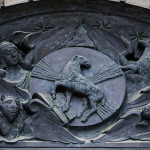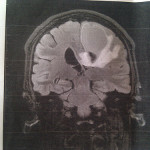We run our website the way we wished the whole internet worked: we provide high quality original content with no ads. We are funded solely by your direct support. Please consider supporting this project.

The Nature of Human Rebellion
God placed Adam in the Garden and instructed him to “protect” it (Gen. 2:15). The word is often translated “till” or “keep,” implying that Adam’s main responsibility was to protect the pristine Garden from weeds. This is certainly a possible interpretation of this word, but in light of the cunning serpent that shows up in the very next chapter, we suspect Adam was supposed to protect the Garden from something much worse than weeds. Besides, the narrative suggests that things like weeds didn’t appear in the Garden until after the rebellion.
The serpent is described simply as the most cunning beast that God made (Gen. 3:1). However, in ancient near eastern culture, the serpent was often a symbol of evil. New Testament authors as well as most theologians in the early church assumed that the serpent was either an animal-incarnation or a symbolic representation of Satan. Whatever aspects of this story we interpret literally or figuratively (the church has never insisted on one way of interpreting this story), it seems very clear that Satan was seeking to co-opt our primordial parents into his rebellion— and, tragically, it worked.
Out of love, God had placed two trees in the middle of the Garden. One was the “Tree of Life” and the other was “The Tree of the Knowledge of Good and Evil.” The first represents God’s provision of everlasting life with him while the second represents God’s “No Trespassing” sign. The two trees were God’s loving way of reminding the first couple that the beautiful life God intended for humans revolved around their trusting him as their source for life, while honoring the boundary between them and God. God alone is final judge of the world, and, for us to be like God in how we love, we must refrain from trying to be like God in how we judge.
The way the serpent deceived Eve—and continues deceive people today—was by convincing her that God was not altogether good. This is the way rebellion against God works. Satan convinced Eve that God did not have her and Adam’s best interest at heart when he forbade them to eat from the mysterious tree. Indeed, the serpent actually suggested that God had acquired his own omniscience by eating from this tree and that God’s motive for forbidding Eve to eat from it was that he didn’t want any competition (Gen. 3:5). If Eve would violate this “No Trespassing” sign, the serpent suggested, she could improve her lot in life and be “like God, knowing good and evil.”
The moment Eve accepted this pathetic picture of God, she no longer trusted her Creator to be her sole source of life. When she looked at the tree through the lens of her newly acquired false picture of God, the poisonous fruit of the forbidden tree seemed “good for food,” “pleasuring to the eye,” and “desirable for gaining wisdom” (Gen. 3:6). As Eve’s fallen descendants, the same thing happens to us. Whenever we’re not trusting God and getting our sense of fullness of life from him, we look at the world with hungry eyes and things that otherwise would not seem “eatable” begin to look delicious. If our souls were satisfied with the fullness of life our Father longs to pour into us, we would never suspect that things like power, pleasures, possessions, fame, knowledge, or disobeying God in any way could be a way to acquire our ultimate worth, significance or security. These things take on an appealing appearance only because we view them through hungry eyes.
Under the delusion of her demonically-inspired false picture of God, Eve rebelled against God and tried to acquire life for herself by eating from the forbidden Tree. Adam then followed suit, and God’s beautiful plan for humans was derailed. The same continues today. What lies about God have tempted you to question God’s goodness? What sources outside of God are you trying to use to fill yourself up with life?
—adapted from an unpublished manuscript.
Category: General
Tags: Satan, Sin, Spiritual Warfare
Related Reading

Typhoon Haiyan and “Natural” Evil
Greg recorded his thoughts a few days ago on Typhoon Haiyan and the reality of “natural” evil that’s not really natural at all. “This an enemy has done.” (Matthew 13:28)

Podcast: Did Evil Exist Before Lucifer’s Revolt?
Greg talks about evil and the goodness of creation, then considers some speculative inferences about the existence of creation for all eternity. http://traffic.libsyn.com/askgregboyd/Episode_0416.mp3

The Final Battle in Revelation
I will conclude this series on the violent imagery in Revelation by addressing the infamous eschatological battle scene found in 19:11-21, for it is this graphically violent section of Revelation that is most frequently appealed to by those who argue against the claim that Jesus reveals an enemy-loving, non-violent God that is unconditionally opposed to…

Podcast: Could Jesus Have Sinned? (part one)
Greg considers the nature of temptation and the temptability of God. http://traffic.libsyn.com/askgregboyd/Episode_0114.mp3

Prayer and Co-Reigning with God
God’s primary objective is a world in which free agents love God and one another. For this to be possible, people need a stable environment and freely chosen, irrevocable, morally responsible say-so. Prayer is simply the spiritual side of our morally responsible say-so. We influence things by what we do through our bodies and in…

Why Did God Heal or Not?
In 1996 a 27-year-old man in my church named David was diagnosed with an inoperable brain cancer. The doctors decided to send David to the Mayo Clinic to receive some experimental treatments on the slim hope these might at least prolong his life. The night before David left, I and a dozen other people went…
